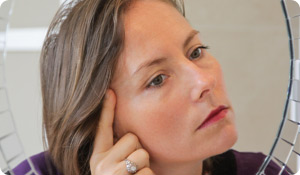
In a society obsessed with beauty, most of us don't want to stand out because of our appearance. Whether you have a physical deformity, or are just unhappy with some aspect of how you look, insecurities about your appearance can negatively affect your quality of life and mental well-being.
Physical attributes that tend to cause distress include being overweight, skin conditions such as psoriasis, birth defects, and disfigurements from an accident or illness. Some, such as acne, are typically age-related.
Body image concerns are serious. Adolescents who have a negative body image are more likely to be depressed, anxious, and suicidal. In a review of studies of teens with acne, researchers found the presence of acne had a significant impact on self-esteem and quality of life, and the teens were more likely to have psychological disorders.
Of course, most teens outgrow acne. Many other physical attributes that trigger insecurities are permanent. Arthritis and lupus, for example, can cause visible physical deformities.
Body image concerns may arise suddenly following surgery for a serious disease, such as diabetes, which sometimes leads to lower extremity amputations. Women who undergo breast removal because of cancer may have trouble coping with the changes in their body. These concerns tend to surface after treatment concludes, when the urgency of a new diagnosis has passed. Making efforts to improve their physical attractiveness gives women a sense of control over their appearance and is effective for coping with depression.
Regardless of the cause, people with physical handicaps or disabling medical illnesses are much more likely to experience depressive disorders.
Some people suffer from a condition called Body Dysmorphic Disorder (BDD). Individuals with BDD are preoccupied with imagined physical defects, or exaggerate their reaction to minor flaws. Cognitive Behavioral Therapy helps teach people with BDD to stop automatic negative thoughts about their bodies, and to learn to see themselves in a more realistic and positive way. Interestingly, cosmetic procedures to fix perceived flaws generally do not improve self-image in people with BDD.
If you have a physical attribute that distresses you, learn how others have coped with similar challenges. Here are a few tips:
- Develop your own coping strategies, so when you feel insecure, you can change the way you think about your condition.
- Surround yourself with people who respect and support you.
- Record your feelings in a journal or join a support group, and consider learning relaxation and stress management techniques.
- If your insecurities persist, see a mental health professional.
Sources:
ScienceDaily. "Disfigurement Is More Than Skin Deep." Web. 23 June 2010.
http://www.sciencedaily.com/releases/2010/06/100623085845.htm
Osteogenesis Imperfect Foundation. "Social and Emotional Issues of Living with OI." Web.
http://www.oif.org/site/DocServer/Social_and_Emotional_Issues_of_Living_with_OI.pdf?docID=7227
Mayo Clinic "Body dysmorphic disorder. Web. 5 November 2010.
http://www.mayoclinic.com/health/body-dysmorphic-disorder/DS00559
ScienceDaily. "Negative Body Image Related To Depression, Anxiety And Suicidality." Web. 6 June 2006.
http://www.sciencedaily.com/releases/2006/06/060606224541.htm
Healthfinder.gov. "Image Concerns Tied to Depression in Arthritis, Lupus Patients." Web. 2 April 2007.
http://www.healthfinder.gov/newsletters/pain040207.asp#1292817
Edmunds, Marilyn W.,PhD, CRNP. "The Role of Body Image in Adjustment to Breast Cancer." Medscape Medical News. Web. 7 October 2010.
http://www.medscape.com/viewarticle/729829
Dunn, Lauren K., PhD, O'Neill, Jenna L., MD, and Feldman, Steven R., MD PhD. "Acne in Adolescents: Quality of Life, Self-Esteem, Mood, and Psychological Disorders." Dermatology Online Journal 17(1) (2011): 1. Medscape Medical News. Web. 2 February 2011.
http://www.medscape.com/viewarticle/736421





